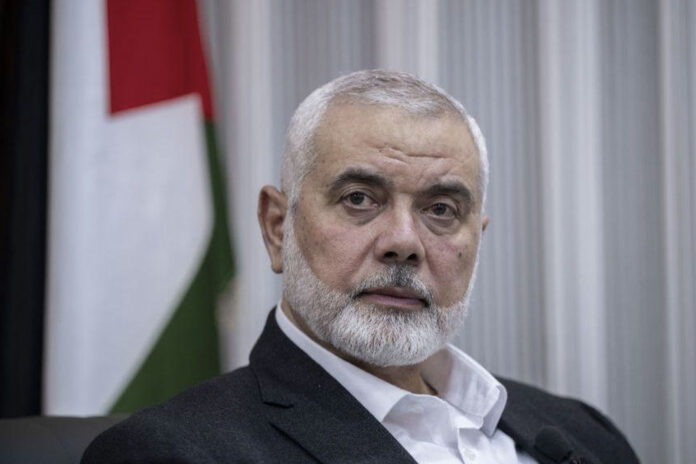In a politically stunning move, Hamas’s political chief Ismail Haniyeh has been assassinated in Tehran, Iran late last night/ today early morning, according to statements released by Hamas and Iran’s Islamic Revolutionary Guard Corps, both of which blamed Israel for his death.
Haniyeh and his bodyguard were killed in what is being dubbed by Iran as a ‘rocket with a seven-kilogram (about 15-pound) warhead’ that struck his room, in the heart of Tehran. Haniyeh was in Tehran to attend the inauguration ceremony of Iran’s President Masoud Pezeshkian yesterday on Tuesday.
In another major development in Beirut, Lebanon late last night; the Israel Defence Forces killed the Hezbollah Commander Fuad Shukr in an airstrike. Israel has said that Shukr was “the commander responsible” for the deadly attack last week on the Israeli-controlled Golan Heights that killed 12 children.
Further yesterday night, the United States launched airstrikes in Iraq, hitting a base south of Baghdad that was used by Iraq’s Popular Mobilization Forces (PMF), killing four members of the group that contains several Iran-backed armed militias, while wounding others.
These three developments in the Middle East last night, were a coordinated and sharp response against Hamas, Hezbollah and Iranian backed proxies in the region, dramatically escalating the Middle Eastern tinderbox. Most shocking of all was the assassination of Hamas Political Chief Ismail Haniyeh, given the circumstances and timing of his visit to Tehran.
Haniyeh was in the Iranian Capital for the inauguration ceremony of Iran’s new President Masoud Pezeshkian, who won the elections earlier this month. He had met with Iran’s Supreme Leader Ayotollah Ali Khamenei just a few hours before he was assassinated and ironically had been part of a group photograph at the inauguration ceremony, sharing the stage with delegations from 80 countries, including the Indian delegation which was led by Union Minister Nitin Gadkari.
While Israel has owned the Beirut assassination of Hezbollah commander Fuad Shukr, there is complete silence from Israel on the killing of Ismail Haniyeh, even as the world whispers about Mossad’s audacity and intelligence network used in the hit. Mossad is Israel’s national intelligence agency and history has shown that after such high profile assassinations on foreign soil, Israel prefers to remain silent.
The fact that Hamas’s political leader Haniyeh was targeted and killed in Tehran, at a time when the capital was on high alert owing to the presidential inauguration ceremony and the visiting international political delegations, demonstrates just how sophisticated the Israel-US intelligence apparatus in Iran is.
Haniyeh’s death has sent shock waves across Hamas rank and file, particularly since he had been playing a key role in negotiations over a ceasefire deal in Gaza. Hamas has described the strike on Haniyeh as a ‘severe escalation’ that would not achieve its goals. What now remains of the ceasefire negotiations between Israel and Hamas is in much doubt.
More dangerously though, his killing will be seen as absolute “humiliation” in Tehran, given the context in which it happened, raising remarkable questions about the safety and security of senior Iranian political and military figures.
Hezbollah on their part – having lost a senior commander like Fuad Shukr, who is often described as the right-hand man to Hezbollah Secretary-General Hassan Nasrallah – will most likely see the strike as a provocation too far, making a reaction almost inevitable, given that Shukr was targeted in the group stronghold in Beirut. It is estimated that Hezbollah has around 1,50,000 missiles and rockets, that it could unleash on Israel.
Until now, most of the violence between Israel and Hezbollah have been contained to areas along the Lebanon-Israel border. But there have been fears that the fighting could escalate into a major conflict, and involve other Iranian-supported groups in the region. So far, both Israel and Hezbollah have indicated that they are reluctant to be drawn into an all-out war, which could have catastrophic consequences for Lebanon, Israel and the region as a whole.
Yet, the strike on Iran dynamically changes the situation given that just a few months ago in April 2024, Iran had directly attacked Israel with hundreds of rockets and drones, after Israel had struck its diplomatic consulate in Damascus, Syria. Now that Israel has allegedly directly targeted the Iranian Capital itself, humiliating Iran at a crucial time of political domestic transition, Iran can be expected to have a ‘dramatic response’ to this big escalation, as it will come under increasing pressure from hardliners within.
Following the horrible October 7, 2023 massacre and terror attacks in Israel, the Israeli leadership, both political and military, have made no qualms about eliminating Hamas, the organisation that rules Gaza and was responsible for the October 7 terror attacks, calling the Hamas leadership as “dead men walking” in remarks to the press days after October 7. Hamas’s Gaza Leader Yahya Sinwar, is said to be still hiding in the tunnels of Gaza, with no information yet of whether he is dead or alive.
As new information comes to light on what transpired in the Middle East last night, it remains to be seen how these killings will impact the Israel-Hamas war on the ground in Gaza and shape the larger regional conflict, as the two arch enemies – Iran and Israel now confront each other without proxy.
All bets are off as the Middle East tinderbox catches fire once again.










